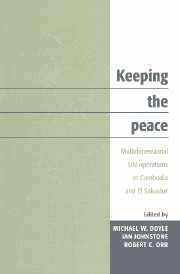15 - Strategies for peace: conclusions and lessons
Published online by Cambridge University Press: 22 October 2009
Summary
Introduction
The problems of peace enforcement manifested so signally in Bosnia and Somalia were avoided in Cambodia and El Salvador. Recognizing the continuing political significance of national sovereignty, the UN sought out a consensual basis for a restoration of law and order in Cambodia and El Salvador and tried to implement its global humanitarian agenda in a way that produced less friction and more support. As our authors have shown, UNTAC and ONUSAL contributed to the UN's commendable record of success in multidimensional peace operations established in conflicts as diverse as those in Namibia (UNTAG), and Mozambique (ONUMOZ). After summarizing the results of UNTAC and ONUSAL, we will now draw lessons concerning ways in which the international community can enhance the UN's role in peacemaking, peacekeeping and peacebuilding and thereby succeed in managing these complex multidimensional operations that are increasingly likely to be the hallmark of the UN's contribution to international peace and security.
The record of successes and failures
Defining success and failure in complex peace operations is far from an exact science. Should one measure the extent to which the agreed mandate was fulfilled, article by article? Or should one focus on whether peace and reconciliation – the operations' fundamental purposes – were achieved? Or perhaps how much order or justice improved, and what credit – or blame – the UN should be given for the change?
- Type
- Chapter
- Information
- Keeping the PeaceMultidimensional UN Operations in Cambodia and El Salvador, pp. 367 - 391Publisher: Cambridge University PressPrint publication year: 1997
- 1
- Cited by

